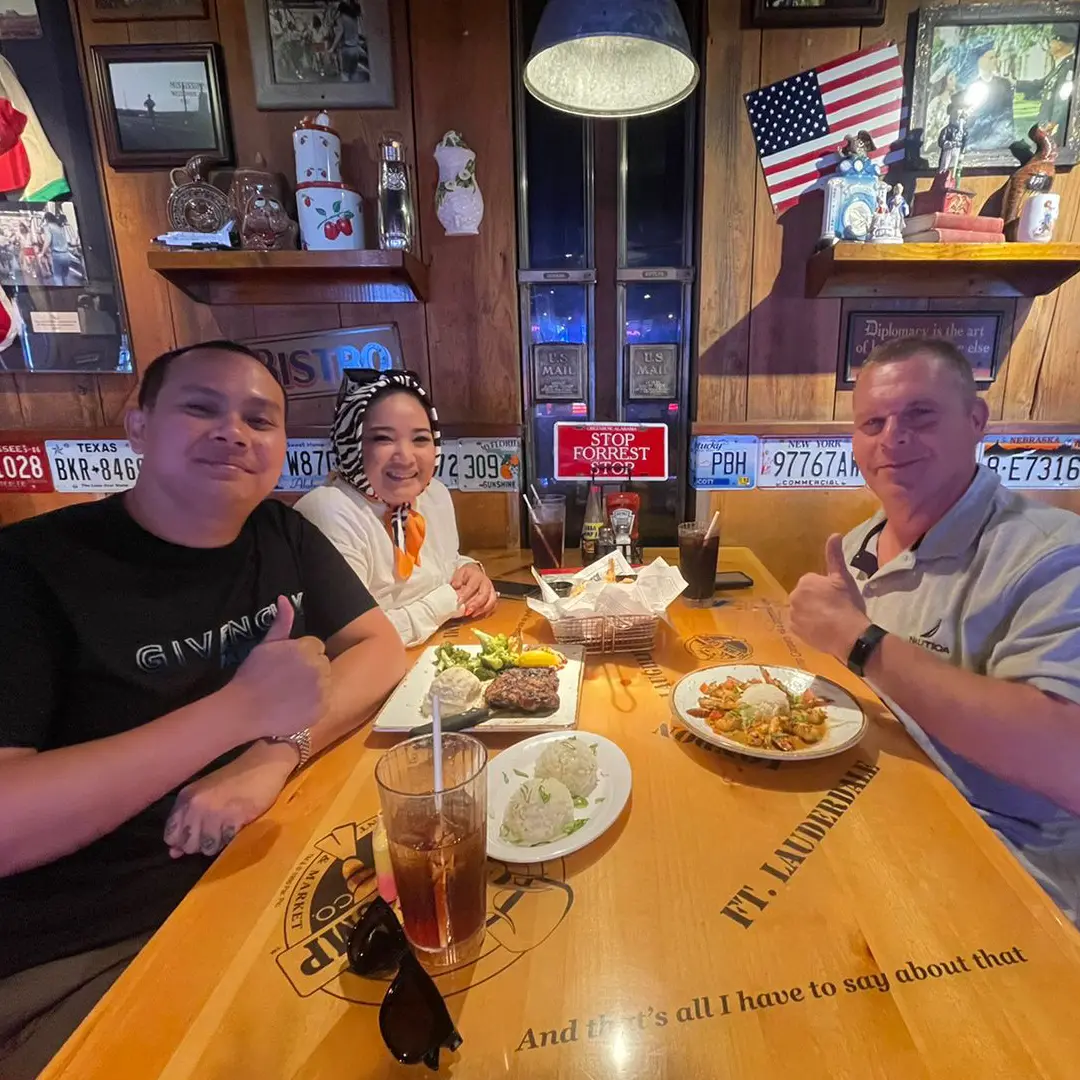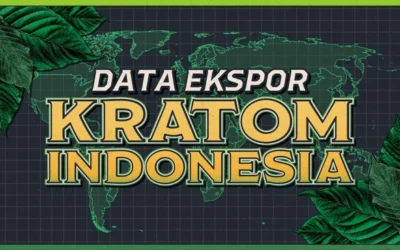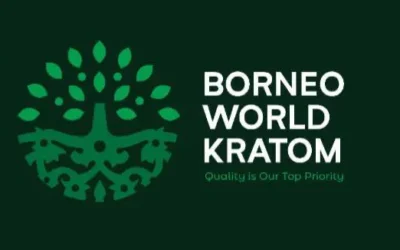Kratom suppliers
We have been discussing mitragyna speciosa for a long time at Christopher’s Organic Botanicals, but we have never discussed our suppliers. There have been many changes in Indonesian government and changes with kratom trade practices that are creating economic stability for the future of kratom in Indonesia.
Our Meeting was at Bubba Gump Shrimp in New York City. We discussed numerous issues and work together for a common goal for kratom.
Our supplier in Indonesia Trinusa Herbalindo (BWK) has been working with mitragyna speciosa for many years and has built long standing relationships. They have unique relationships with farmers in Jong Kong and in the West Kalimantan rainforest.
We had a meeting this past weekend in New York City and discussed the current and future landscape of mitragyna speciosa. I was impressed by the modern facilities and techniques used to process high quality kratom. Obviously, they were investing a lot of money into these facilities in Indonesia and want our beloved tree to be here for future generations.
The mitragyna speciosa supply chain in Southeast Asia is rapidly changing, and we are heading in an amazing direction. Kratom vendors should purchase fair trade products as an investment in Indonesia. There are not official fair-trade labels yet, but we are working on a solution.
New machines, testing facilities, and all modern equipment for kratom processing. Now I know that they were not using old coffee grinders from the Vietnam War like some processors use, but this new equipment was what you would see in the United States at a GMP facility.
It was great to see money being used to improve things. It’s difficult to harvest kratom and do everything correctly in a jungle.
We are a small family business and making sure we spend money correctly is very important.
Indonesia rainy season
The rainy season in Indonesia typically occurs between November and April. During this period, the country experiences increased rainfall, high humidity, and occasional thunderstorms.
The rainy season can vary in intensity and duration depending on the region within Indonesia. It is essential to be prepared for potential travel disruptions, flooding, and landslides during this time.
During the rainy seasons, drying kratom properly becomes a challenging task. The increased humidity in the air makes it difficult for the leaves to dry effectively. Kratom leaves need to be dried thoroughly to preserve their potency and prevent the growth of mold or mildew.
The rainy weather prolongs the drying process as the moisture in the air hinders the evaporation of water from the leaves. This extended drying time can lead to a decrease in the alkaloid content of the kratom, which is responsible for its desired effects. Additionally, the prolonged exposure to moisture increases the risk of bacterial or fungal growth on the leaves, compromising their quality and safety.
To overcome these challenges, kratom farmers and processors employ various techniques. They may utilize indoor drying facilities with controlled temperature and humidity levels to ensure a consistent drying process. Alternatively, they may use artificial heat sources or dehumidifiers to accelerate the drying process and minimize the risk of contamination.
Another approach is to harvest kratom leaves during the dry season to avoid the adverse effects of excessive moisture. By carefully timing the harvest, farmers can ensure that the leaves are at their peak potency and can be dried more efficiently.
Furthermore, proper storage techniques are crucial during the rainy seasons to maintain the quality of dried kratom. It is essential to store the dried leaves in airtight containers in a cool and dry environment to prevent moisture absorption and preserve their freshness.
In conclusion, the rainy seasons pose significant challenges to drying kratom properly. However, with the use of appropriate drying techniques, careful timing of harvest, and proper storage methods, kratom farmers and processors can overcome these obstacles and ensure the production of high-quality speciosa products.
Our Farmers must be paid right and shown that we care about them. Without the kratom farmers we would not have kratom. No Farmers No Food!
Indonesia has many islands and is truly a vast area of rainforests and jungles. Google Earth is a fantastic way to see Indonesia if you cannot fly out! I had the opportunity to be in Indonesia as we speak, but we had meetings here with our suppliers and my heart is not the best for 20-hour flights yet.
GMP Indonesia
Over the past two years we have seen more changes with in Indonesia than we have seen in previous years. Mitragyna speciosa farmers are getting organized and demanding higher wages for their kratom leaves. Higher prices are great since this will enable the farmers to get more modern equipment to process leaves.
We have made sure that we are sending our money to groups that are sustaining kratom and not just spending money frivolously. There are a few big groups in Indonesia that are making sure kratom is being managed and processed properly.
Modern equipment and proper sanitary environments are now becoming more the normal in Indonesia as kratom is getting more popular, but there are still plenty of speciosa sellers in Indonesia that sell out of their backyard.
The Kratom industry in Indonesia is still just getting started and it will take many years for proper regulations to be in place. The meetings last week are a good start for future regulations and kratom being evaluated before it leaves the country.
These regulations are good for consumers since it should ensure quality control for exporters of mitragyna speciosa. You will be able to purchase kratom in north America in a few years knowing that a regulatory environment has been set up for protection.
I am not sure what the regulations will be once a system is created, but I am sure it will require proper paperwork, testing, and many other protocols. An official Indonesian kratom company must have these requirements in place and be certified.
Once I know more about how everything will transpire, I will let you know, but for now this is just speculation considering the way the United States and Indonesia work. Qr Code systems for kratom have been introduced to track kratom from farm to table.
Governor Sutarmidji of Indonesia is advocating for the regulation of kratom production in the country in order to ensure the production of high-quality kratom. Kratom, a tropical evergreen tree native to Southeast Asia, has gained popularity worldwide for its potential medicinal properties. However, the unregulated nature of mitragyna speciosa production in Indonesia has raised concerns about the quality and safety of the product.
Governor Sutarmidji recognizes the importance of establishing regulations to govern the kratom industry in Indonesia. By implementing quality control measures, the governor aims to guarantee that only kratom of the highest standards reaches the market. This would not only enhance the reputation of Indonesian kratom but also ensure the safety and satisfaction of consumers. The heading from the Pontinak Post read the following: Poor Quality, Dozens of Kratom Containers Sent Back from the US.
This is a huge issue for Indonesian kratom farmers and the United States kratom Industry. We are to the point where kratom is being handled properly in Indonesia by the leading farmers groups.
One of the key aspects of the proposed regulation is the establishment of strict guidelines for kratom cultivation, harvesting, and processing. This would involve setting standards for the use of fertilizers, pesticides, and other agricultural practices to ensure that the mitragyna speciosa plants are grown in a healthy and sustainable manner. Additionally, the regulation would address the proper handling and processing of leaves to maintain their potency and quality.
Furthermore, Governor Sutarmidji emphasizes the need for comprehensive testing and quality assurance procedures. This would involve conducting regular laboratory tests to assess the alkaloid content, purity, and absence of contaminants in speciosa products. By implementing such measures, the governor aims to eliminate the presence of adulterated or substandard kratom in the market, thereby safeguarding the health and well-being of consumers.
In addition to quality control, the proposed regulation also aims to address the issue of sustainability in kratom production. Governor Sutarmidji recognizes the importance of preserving the natural resources and biodiversity of Indonesia. Therefore, the regulation would include provisions to ensure that kratom cultivation is carried out in an environmentally responsible manner, minimizing the impact on ecosystems and promoting sustainable practices.
Governor Sutarmidji’s push for the regulation of mitragyna speciosa production in Indonesia reflects his commitment to promoting the country’s reputation as a producer of high-quality kratom.
By implementing comprehensive guidelines and quality control measures, the governor aims to establish Indonesia as a trusted source of kratom, attracting both domestic and international consumers. Additionally, the regulation would contribute to the sustainable development of the kratom industry, ensuring its long-term viability while preserving the natural beauty and resources of Indonesia. Too many shipments have been rejected becuase of low quality and it not being pure leaves.
KCPA New Jersey
We wanted to have everything in place for the upcoming Kratom Consumer Protection Act in New Jersey and have all our ducks in a row! We have been in business since 2016 and have used the same Indonesian group.
We had our Standard Operating Procedures professionally re written in 2018 by a company that assists pharmaceutical operations and large food manufacturers. The first 2 years I wrote all my own S.O.P.’s but needed some help in the ever-changing environment.
We have done our best from the beginning. Whether that meant spending more for our bulk kratom or making sure that our farmers were being paid fairly. We made sure that we did the right things. I cannot compete with $60.00 Kilos when I pay more than half that for my raw bulk ingredients.
Do not think for one moment that all Mitragyna Speciosa is the same. I have always known that, but after this weekend visit with our suppliers I know that to be a fact. Especially low priced kratom! Bitter the better for the most part!
We want to see the industry flourish in Indonesia and here in the United States, but we want to see the Kratom Industry work together for the common good of the plant. We may be Hippie Minded in our thoughts, but we believe that fair trade kratom is attainable and we can make sure everyone including the speciosa tree is sustained.
Conclusion
Over the next year there will be some exciting changes coming to Christopher’s Organic Botanicals. We did add a kratom flash sale section for some of our older batches.
We want to be the most transparent herbal company that you can find, and we stand by all our products 100%. We have been in the business since 2016 and know the proper people to get us old tree quality kratom!
We should have Chewable kratom tablets in the next week or two and we are working on our own proprietary tincture that should be ready in September.
We were thinking of adding aromatherapy products next year since we have seen the positive implications it can have for some issues. Let us know what you think about us adding aromatherapy products?
Please let us know!
Thank You for reading and remember that exciting things are happening now and over the next few months with kratom.






0 Comments